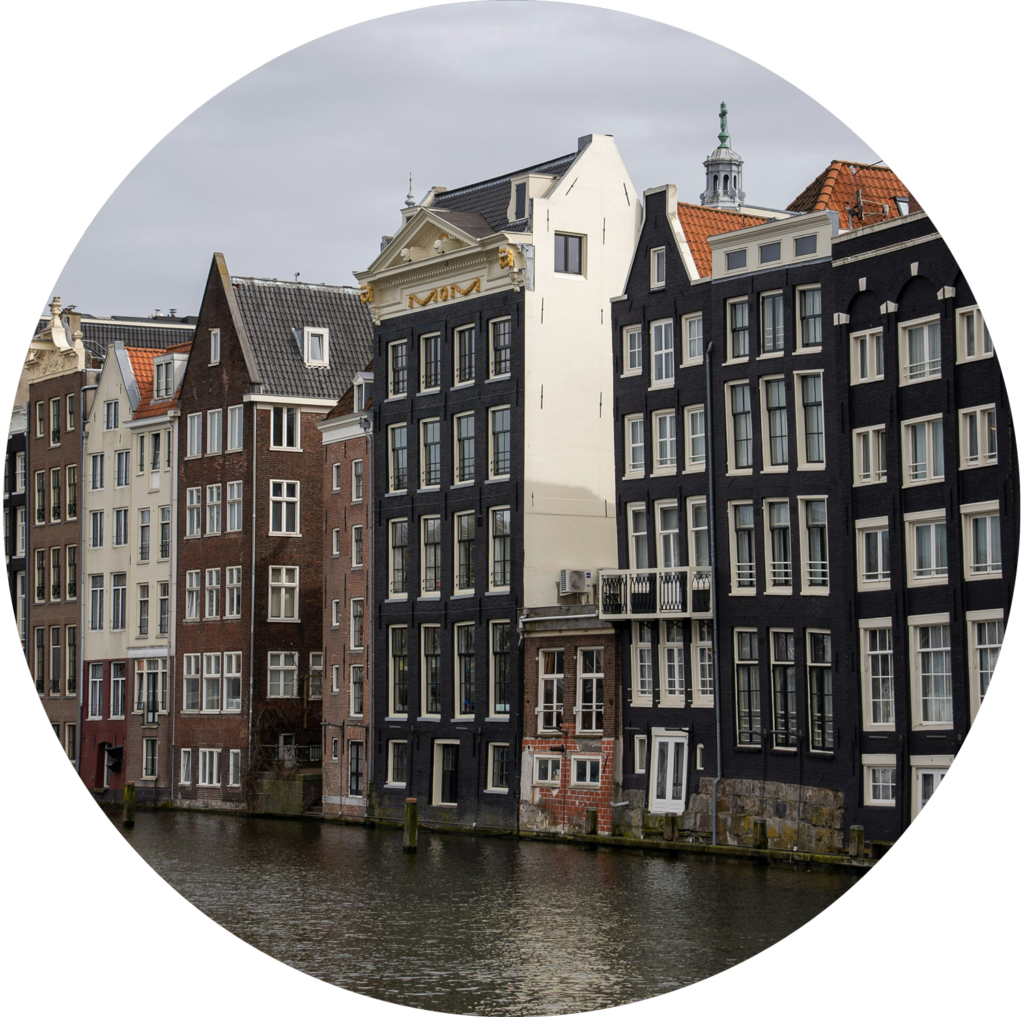Study Areas
The CDCUL project involves collaborators from three countries: Sweden, The Netherlands, and Slovenia. Each country offers a different socioeconomic context for sharing, and each has a unique history of sharing among neighbors.

Sweden
Sweden is a country of 10.7 million mostly urban inhabitants. Since 2020, about ninety percent of the Swedish population lives in one of 290 “localities” including about 2 million in Sweden’s three largest cities Stockholm, Gothenburg, and Malmö. Nearly one half of all Swedish households consist of adults living alone. The country is also experiencing a rapid process of cultural diversification: As of 2023, about one out of every five Swedish inhabitants is foreign-born. Between 2010 and 2023, 1.16 million individuals immigrated to Sweden, including 532,243 from Asia and the Middle East.
Current Situation of Sharing
For most of the twentieth century Swedes accessed laundry facilities in neighborhood-based tvättstugor (laundry huts). These spaces were often located in a building’s basement or a small outdoor building in a courtyard. Such facilities are less and less common in new construction, however. Today Swedish cities accommodate shared mobility like e-scooters, bikeshare, and various forms of carshare. Since 2013 a network of hundreds of leisure banks (fritidsbanker) has offered free-to-customer sporting equipment libraries. A variety of grassroots and informal sharing opportunities in multiple cities can be discovered on the website Smarta Kartan (The Smart Map).
75% of Swedes bought second-hand clothing and accessories in 2023, up from only 28% in 2018.
About 42 percent of all Swedish households are single adults without children.
Country specific challenges that sharing could solve
A very large proportion of the Swedish adult population lives alone. About 42 percent of all Swedish households are single adults without children and an additional 7 percent are single adults with children. There are nearly twice as many single-adult households than either households consisting of couples with children or couples without children. Whether by choice or by necessity, solo-living can place strains on energy- and resource efficiency that could be achieved by sharing in a multi-person household. Opportunities to share with neighbors could allow for households to enjoy the advantages of solo living without the corresponding high consumption.
The Netherlands
The Netherlands, also known as Holland, is a vibrant Northwestern European country with a total population of over 17 million. Demographically diverse, it encompasses various age groups, notably a significant working-age cohort (15-64 years old) alongside an aging population due to extended life expectancy. Urbanization is prevalent, especially in cities like Amsterdam, Rotterdam, and Utrecht, while rural areas also sustain communities. Income and socioeconomic disparities persist, with certain regions and demographics enjoying greater prosperity. This dynamic mix of urban and rural life, coupled with demographic variations, shapes the multifaceted landscape of the Dutch society.
Country specific challenges that sharing could solve
“Single adult, childless” households now comprise 41% of Dutch households (Eurostat, 2022b). The Netherlands, Europe’s most densely populated country (excluding city-states) (United Nations, 2022), faces a housing crisis concerning both quantity and affordability. With ambitions for a fully circular economy by 2050 and a 50% reduction in primary resource usage by 2030, shared housing emerges as a solution. By reducing per-person energy and material consumption, shared housing aligns with these goals. It also addresses the severe urban housing shortage, mitigating exorbitant prices. Encouraging shared spaces fosters more affordable, quality rental options. Additionally, multi-generational housing promotes solutions for an aging population’s housing challenges.
Current Situation of Sharing
The Netherlands has a rich tradition of sharing, from collective living to peer-to-peer exchanges. Platforms like Peerby offer alternatives to outright purchasing by enabling lending or renting. While peer-to-peer car sharing in Dutch cities is modest, its popularity is swiftly rising. Across the Netherlands, particularly in Amsterdam, a variety of sharing initiatives have emerged. Beyond giants like Airbnb and Uber, smaller ventures proliferate, fostering sharing economies locally and nationally, with international prospects. Examples range from community-focused platforms like Jan Eef and Buuv to innovative ventures like Lena the Fashion Library and Croqqer. These initiatives, supported by services like Iambnb and 60Days, shape new paradigms of community engagement and resource utilization.
The Dutch ride their bicycles much farther than any other country in Europe. 16% of total distance traveled per day in the Netherlands is on a bicycle. The #2 country is Denmark, where bicycle trips cover 7.5% of total distance traveled.
The Netherlands is a global leader in circularity. According to the Circular Gap Report, the Dutch economy is 24.5% circular, besting all other countries in the world. The country is also home to ambitious plans at multiple levels to improve the Circular Economy.

Slovenia
Slovenia (population 2.1 million) is a geographically diverse country, with Alps in the north, Adriatic Sea in the southwest and the Pannonian Plain in the east. The urban population is centered in four larger cities, while the population in rural areas also remains relatively high. Slovenia’s urban centers are shaped by different different histories, which directly affect building styles and lifestyles, especially as the needs of present-day society changed to a faster tempo and more individualized lives.Current Situation of Sharing
Larger cities are advancing faster with changes and implementations of public projects like e-bike and bike-sharing stations, private rentals of e-scooter and short-term electric car rentals (car-sharing). As for the shared use of living spaces, it is present in many student dormitories and retirement homes. Ljubljana also started experiments with communal workshops and laboratories. We are seeing larger stores and companies organize rental schemes for specific appliances, professional tools, and small trucks or trailers. Most of these solutions are focused on the nation’s capital Ljubljana leaving out the smaller cities, which calls for a national approach to the topic.
In the last two decades, the share of privately owned apartmens rose from 72% to 92.1%.
Ljubljana’s bike sharing service has more than 52 000 users, which is 17% of the city residents.
Country specific challenges that sharing could solve
In Slovenia, the development of the circular economy is in its initial phase, with the concept of sharing solutions still very new. Slovenian society is traditional when it comes to ownership issues; having “your own” represents safety, comfort and status, with the exception of informal sharing with close neighbors or extended family. Innovative solutions like cargo-bicycle sharing could minimize traffic and pollution in cities, while shared-access kitchens and workshops would allow for more flats, contributing to solving a growing housing problem in the country. Study spaces would unburden university libraries and study spaces, which are currently overcrowded. Results from this project will offer guidance about how to meet these needs while aligning with circular economy principles and a greener future.

